Below are brief testimonials from a few of the many Department of Philosophy alums who have gone on to careers in academia, describing in their own words how studying philosophy at the University of Chicago has shaped their academic endeavors. In recent years, we have placed many of our graduates at top-ranked programs in our field (see below).
Ethan Reiter, Fulbright Master's Degree Student in Mind, Brain, and Consciousness, Taipei Medical University (BA 2024)
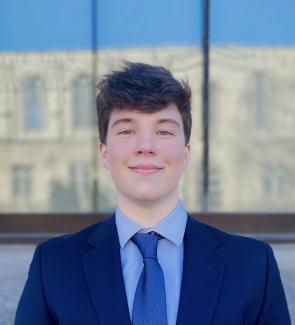
My study of philosophy at UChicago first drew me to questions about consciousness and the self that bridge empirical and non-empirical lines of inquiry, ultimately sparking a sustained interest in the neuroscience of consciousness. As I explored senior essay topics and took more of the department’s excellent courses in philosophy of mind and cognitive science, I discovered my current Fulbright Master’s program in Taiwan as a way to develop complementary empirical training. The Department of Philosophy’s breadth and exceptional mentorship opportunities not only supported my fellowship trajectory, but also allowed me to pursue my questions about the mind wherever they led, all within a unified course of study. The habits of systematic reflection and ongoing critical questioning that the Philosophy major cultivated continue to shape my empirical research––from keeping me clear-eyed about the limits of neuroimaging to enriching my critical discussions of consciousness theories with neuroscientists. I remain tremendously indebted to my professors and peers in the department for always pushing me to think with greater clarity and rigor and for opening paths for me to pursue my interdisciplinary interests.
Madeleine Roberts, PhD Student, Philosophy, Princeton University (BA 2024)
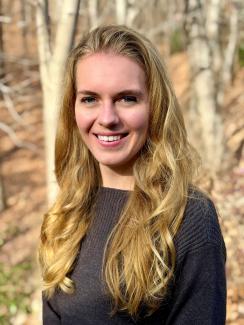
In the Philosophy & Allied Fields major, I found a perfect home for my mutual love of small particles* and big questions. Alongside a physics double major, the program exposed me to an impressively broad range of coursework; highlights include graduate-level classes on general relativity and ancient philosophy of race and ethnicity (in the same quarter!). Furthermore, writing a BA thesis during my senior year was the single most important academic experience I had in college: the process not only prepared me for graduate-level research in philosophy of physics, but it also sparked a host of fun conversations with philosophically-minded friends that would become some of my most cherished memories at UChicago.
*"Field excitations” is probably more accurate, but decidedly less pithy.
Kaidi Pan, PhD Student, Philosophy, Yale University (BA 2023)

When I was a student in the UChicago Philosophy Department, I often told myself that life couldn’t get any better. The friendly community, the kindness and accessibility of the faculty, the vibrant department events, and the immense depth and breadth of philosophical thought across traditions all made for one of the most rewarding academic experiences I have ever had. Even years after graduation, I can still picture myself working in the department hallways, where some of the most stimulating and spontaneous philosophical conversations would unfold. I remain in contact with many of my teachers and classmates to this day.
What stays with me most, however, is something I only fully appreciated after graduating: the remarkable breadth of the department’s curriculum. The courses I took—spanning a wide range of philosophical topics, methods, and traditions—planted countless seeds. Many of them only blossomed later, developing into well-connected ideas that continue to shape my intellectual and professional life. It is a place whose impact grows with time. The education I received at UChicago Philosophy not only prepared me for the rigor and demands of graduate school, but also equipped me to navigate the vast landscape of ideas. Being a student here was truly a blessing, and I remain deeply grateful.
Ava Geenen, PhD Student, Philosophy, University of North Carolina at Chapel Hill (BA 2020)

When I first started studying Philosophy at UChicago, I expected my studies to be a stepping-stone on my way to a legal career. However, along the way I discovered an insatiable philosophical curiosity that led me to UNC Chapel Hill's Philosophy PhD program. The deep historical grounding that UChicago's undergraduate degree provides has been an incredible asset in pursuing my PhD. Looking back on the papers I wrote as an undergraduate, I see that the UChicago Philosophy Department exposed me to questions, concepts and texts that remain central to my research interests.
Ben Andrew, PhD Student, Philosophy, University of Southern California (BA 2019)
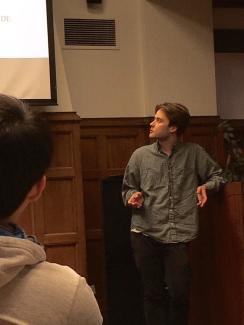
The philosophical community at UChicago is excellent! I was consistently taken seriously and supported in becoming a better philosopher by my mentors and peers. By interacting with this community, not only did I acquire the academic skills and broad acquaintance with the subject matter that one needs to pursue philosophy at the graduate level, I also acquired strengths of character which I think will serve me well in this endeavor. I learned the courage one needs to pursue the questions one thinks are important and take the positions one thinks are right. I also learned the respect needed to interpret others’ views charitably and to take them seriously. From the example of other members of the Department of Philosophy at UChicago I learned the humility needed to see the holes in one’s own views and to accept when someone else points out a hole that has slipped by unnoticed. Finally, at UChicago I learned the persistence needed to work through philosophical confusion and arrive at philosophical clarity. I feel well prepared to continue doing, and enjoying, philosophy thanks to my time at UChicago.
Caroline Hoskins, PhD/JD Student, Rutgers University Philosophy and University of Michigan Law (BA 2019)
While academic rigor may be at the core of all UChicago departments, I found the Department of Philosophy to be a uniquely ideal setting in which to grow into a more curious, passionate, and sharp thinker. The supportive environment of the department encouraged me to find my voice in the classroom and to take more risks in my thinking, and I found mentors who supported me and pushed me to grow in my studies. The breadth and depth of course offerings in the department offered me the opportunity to study a wide range of topics in the field, and also to begin to specialize in those areas I found the most engaging. I also wrote a B.A. thesis with Professor Agnes Callard on knowledge acquisition in the Socratic method, which enabled me to go through the process of researching and writing a longer, more focused paper. That experience, in turn, prepared me to more confidently apply to graduate programs. During the next few years, I will be pursuing both a Ph.D. in philosophy at Rutgers University and a J.D. at the University of Michigan Law School. I wholeheartedly credit my undergraduate studies in philosophy at UChicago with inspiring me to pursue a career as an academic and for providing me with the mentorship, resources, and rigorous academic preparation to do so.
Cal Fawell, PhD Student, Philosophy, University of North Carolina at Chapel Hill (BA 2019)
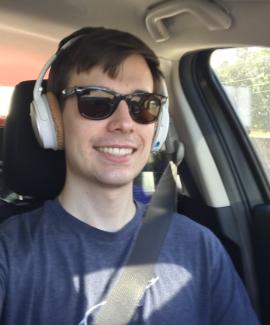
In this life, we are not often graced with moments of genuine clarity. I have, therefore, been singularly blessed to have had multiple such moments directly precipitated by UChicago’s philosophy program. The first of these came within days of my first philosophy class, and amounted to the decision to declare the major; another was to firmly set my sights on pursuing graduate study in philosophy. Looking back on my time studying philosophy at UChicago, neither of these decisions are very surprising. Courses promised deep familiarity with topics and figures, and discussions in and out of class—due in no small part to the exceptional character and genius of professors, graduate students, and peers—were always rewarding. Engaging critically with texts and arguments alongside peers, I learned how to wrestle well with philosophical positions, understand different thinkers’ intellectual trajectories, and see to the heart of abstract issues. A deep appreciation for philosophical rapport and inquiry was instilled, one which I look forward to cultivating through further philosophic reflection in graduate school and beyond.
Lauren Richardson, PhD Student, Philosophy, Rutgers University (BA 2018)
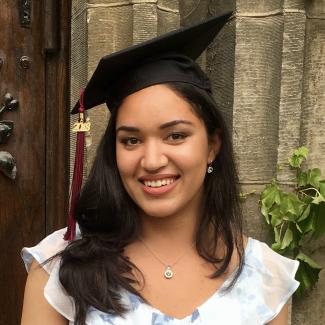
I credit philosophy for truly introducing me to the “life of the mind” at the University of Chicago. Studying philosophy challenged me to think rigorously and analytically, to engage critically with texts and ideas in the “canon,” and to set very high standards for clarity and precision of thought and argument in my own work. Philosophy continues to make me question my assumptions about myself and the world around me, and I consider it an immense privilege to be able to spend my days thinking about topics as varied and interesting as language, thought, reasoning, communication, agency, obligation... the list goes on. Writing a B.A. thesis provided me with an excellent opportunity to work closely with faculty in the department, and gave me a real idea of what it takes to do independent research in academic philosophy. I will be continuing my philosophy studies in a Ph.D. program at Rutgers University in the fall, and I was very fortunate to have the tireless support and mentorship of faculty at UChicago as I went through the daunting Ph.D. admissions process. UChicago’s department gave me the disciplinary exposure and intellectual training necessary for taking the next step toward working as an academic philosopher; I will always look back fondly on my time here.
Joshua Kramer, PhD Student, Philosophy, University of Pittsburgh (BA 2018)
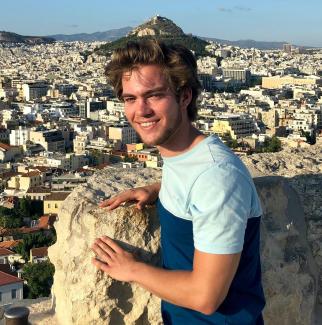
At Chicago Philosophy, I found others who shared the beliefs that philosophical questions emerge often and throughout many areas of our lives and that grappling with that diverse set of questions has import for us. The department surrounded me with thoughtful, passionate, and intelligent peers, graduate students, and professors, who lived through their questions and energized me to keep pursuing mine in a rigorous way. The department’s breadth across historical periods and openness to different methodologies allowed me to explore philosophy’s many subfields through courses and independent studies (from philosophy of race to philosophy of language to philosophy of literature) and the "Philosophy and Allied Fields" program. In my fourth-year, I wrote a thesis on practical desire in Plato with Prof. Agnes Callard and another, combining action theory and feminist/LGBTQ+ philosophy, with Profs. Matthias Haase and Lauren Berlant. These projects allowed me to practice addressing questions that interested me in a precise and contained way. Building on that experience and thanks to crucial support from Chicago faculty, I studied for a master’s in ancient philosophy at St. John’s College, University of Cambridge. I then spent a year as a visiting graduate student, research assistant, and course assistant at Rutgers Philosophy and took seminars at NYU and Princeton Philosophy. In 2020, I started my Philosophy PhD at the University of Pittsburgh. The most important thing I learned at Chicago Philosophy: No matter what, pursue a question when one grabs and sticks with you. Trust that you may be on to something. At Chicago, I found people who supported me in that process. I would not be where I am without their generosity and encouragement.
Matthew Mandelkern, Associate Professor of Philosophy, New York University (BA 2011)
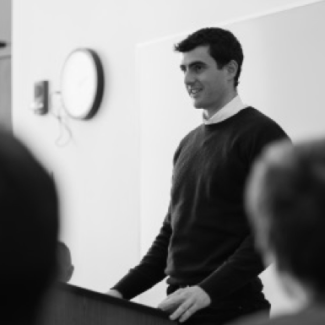
I became fascinated by philosophy as an undergrad at Chicago, drawn in by the philosophy faculty’s amazing teachers and students. I wrote a thesis on Aristotle’s action theory with Professor Agnes Callard and went on to do graduate work at MIT, where I was drawn in by the philosophy of language, which is now my area of focus. Chicago gave me a wonderful introduction to philosophy, as well as enduring relationships with wonderful professors as well as some very talented classmates who have also gone on in philosophy and remain close friends.
(Previously a Postdoctoral Research Fellow at All Souls College, Oxford)
Ethan Jerzak, President's Assistant Professor of Philosophy, National University of Singapore (BA 2010)
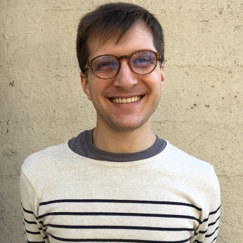
The philosophy major at the University of Chicago was the best preparation for graduate school that I could have hoped for. Not in the sense that it taught me exactly those things that I ended up later researching, but rather because the breadth of courses offered, and the depth of inquiry in those courses, showed me how to approach philosophical problems generally: to motivate them, not as mere curiosities of history, but as arising directly and naturally out of our attempts to understand the world and our place in it. I still draw on those lessons while trying to engage with my interlocutors carefully, charitably, and critically—whether those interlocutors are Heidegger and Kant, or contemporary logicians and formal semanticists.
(Ethan Jerzak completed his PhD at the University of California, Berkeley)
Thomas Salem Manganaro, Associate Professor in English, University of Richmond (BA 2009)
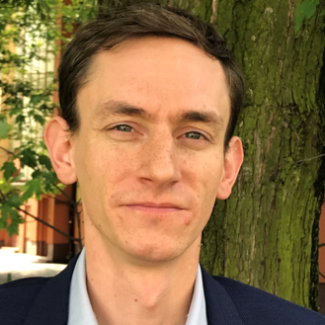
Being a philosophy major at the University of Chicago was essential to my pursuing a career as an academic in English literature. That experience made me internalize standards of clarity and argumentation in ways I did not recognize at the time. It also introduced me to specific ideas, arguments, and questions that I continue to think and write about. Even though I work in a different field in a different place, sometimes I wonder if at heart I’m still trying to be a good UChicago philosophy major.
